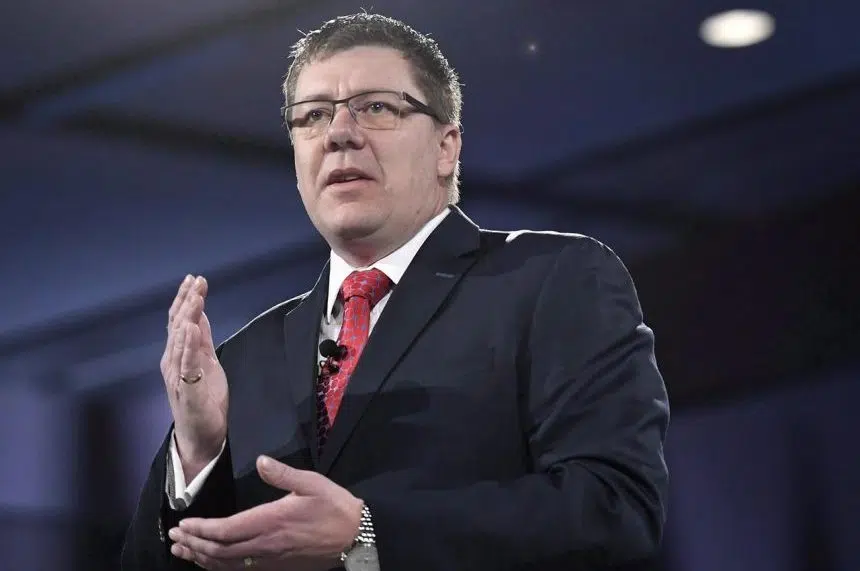Premier Scott Moe says the federal budget released Tuesday doesn’t measure up – especially when it’s compared to the budget his Sask. Party government is to table Wednesday.
“We’re looking at a (federal) budget that is investing in the middle class as a theme,” Moe told reporters Tuesday. “It’s also a budget that is running a larger deficit than our federal government did last year. We’re at about a $19.8-billion projected deficit with no plan to balance.
“It’s concerning with respect to that ‘no plan to balance’ comment and how that impacts our next generation, our children.”
Moe said that the Sask. Party’s “north star” has been to balance its budget. Both Moe and Finance Minister Donna Harpauer have vowed that Wednesday’s provincial budget will be balanced.
Moe said the province had “three fairly specific asks” of the federal Liberal government as it prepared its budget.
The first request was to delay the institution of the carbon tax until a final decision has been rendered in the court challenge of the tax. That request wasn’t met, meaning the carbon tax likely will be imposed in less than two weeks.
The second request was for some incentives for first-time home buyers, and those were included in the federal budget.
The third thing the province was looking for was tax relief – and Moe didn’t see that.
He suggested that the federal government budget didn’t do much to stimulate the economy across Canada, but there was $4 billion being invested in supply management – which primarily is based in eastern provinces.
“But for the industries in Western Canada — like much of the Western Canadian agriculture industry, the energy industry, our mining industry, our manufacturing industry — we don’t see $4 billion,” Moe said. “We actually see a carbon tax and we see imposing regulations that will ensure in many cases that those industries are not going to be competitive with like industries from other areas of the world.”
That said, Moe did see some positives in the federal budget.
An investment in rural Internet projects could assist residents of rural and northern areas in the province. As well, a training tax credit and Employment Insurance incentive for training could assist Saskatchewan residents — especially those who are looking at taking truck driver training courses in the province.
The federal budget didn’t change transfer payments to the provinces, which Moe said was an issue for Saskatchewan. The province, he noted, should still receive $64 million from the federal government.
“We ask for it time and time again as it would greatly enhance our opportunities, both in private industry as well as public power supply industries to reduce our emissions here in the province,” Moe said. “That’s where the conversation needs to be.”
Goodale defends budget
The Liberals are breaking a 2015 election promise to balance the federal budget by 2019.
Prime Minister Justin Trudeau’s government is projecting a $19.8-billion deficit for the 2019-20 fiscal year.
Saskatchewan’s lone Liberal MP, Ralph Goodale, said given the state of the economy over the last three years — when there was more sluggish growth than anticipated — the critical priority for this budget was on investment to drive growth.
“Canadians need the jobs and they need the growth and they need it all across the country,” said Goodale.
He pointed to measures to make housing more affordable for first-time buyers, a tax credit for job training and lowering the interest rate on student loans.
Goodale said the higher spending Liberal plan will create a stronger economy in the long term. It outlines a road forward that the people of Saskatchewan will literally drive on.
There is a one-year doubling of the federal Gas Tax Transfer to municipalities for local infrastructure. Saskatchewan’s share will double from about $60 million to $120 million. Regina’s share of that funding will go from $12 million to $24 million.
“(That will help) to build the streets and the roads and the sidewalks and the sewer systems that make communities livable from a quality-of-life point of view and economically successful in terms of future growth,” said Goodale.
The budget includes $65 million for new STARS helicopters. Its fleet replacement plans say three new helicopters are required in Saskatchewan at a cost of $13 million each.
While farmers in vote-rich Quebec and Ontario will mostly benefit from the $4 billion designated to supply management compensation, Goodale reminded Moe and the west of the $4.5-billion investment in the Trans Mountain pipeline in support of the energy industry.
— With files from 980 CJME’s Lisa Schick and Andrew Shepherd







